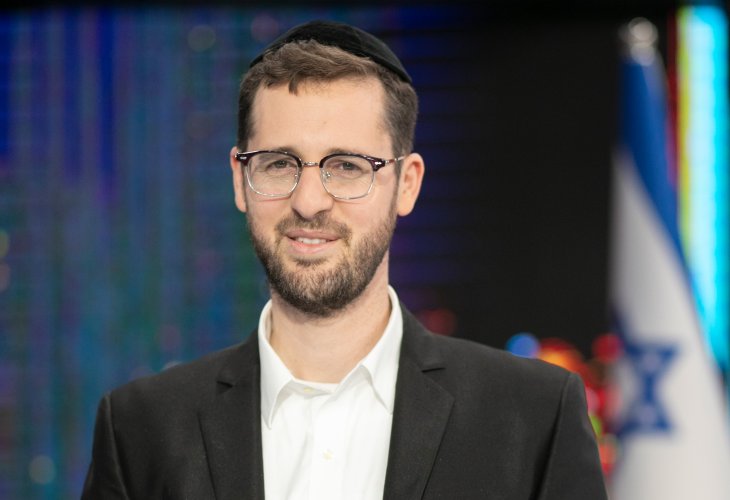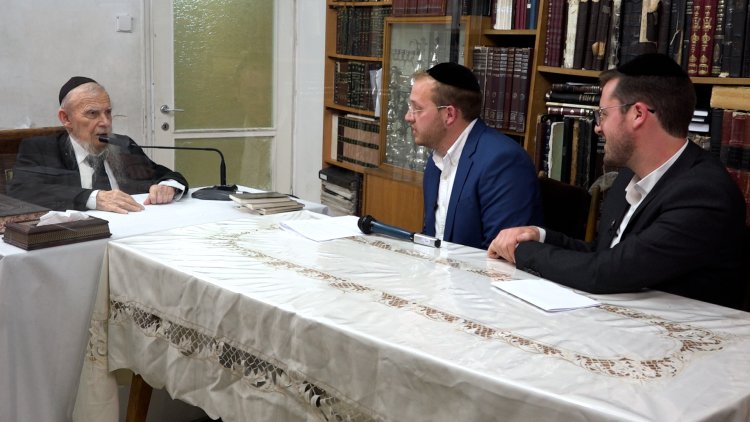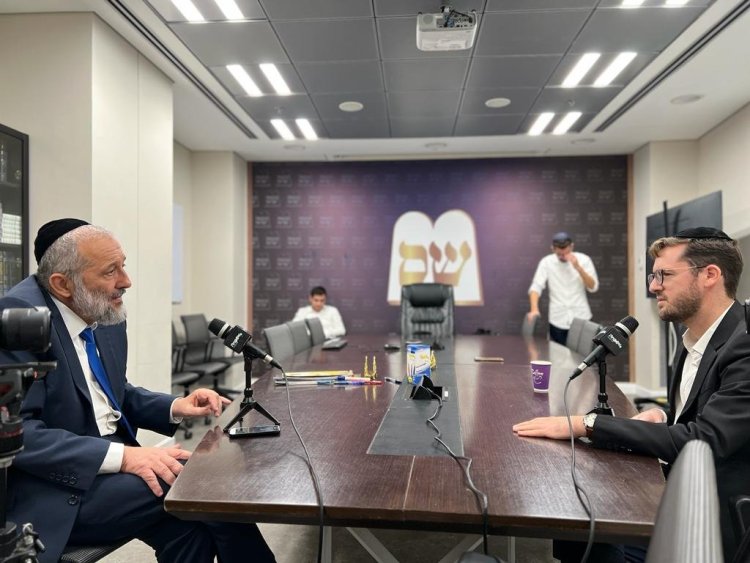"I'll Never Forget What Yedidya Told Me: 'I'm So Happy for You and So Sorry for You'"
Yisrael Meir shares insights on his daily Talmud class and an unforgettable encounter with Rabbi Gershon Edelstein.
 Yisrael Meir (Credit: Roy Shpernik)
Yisrael Meir (Credit: Roy Shpernik)"On the last night of Simchat Torah, at ten-thirty in the evening," recounts communication consultant Yisrael Meir about his life's most important endeavor, "I asked in the WhatsApp group of participants in the daily Talmud class I am privileged to teach if anyone wanted to study. The class takes place five days a week, not on Shabbat evening. When we were exposed to the horrors that unfolded at the close of Shabbat, we realized that we did not yet comprehend the scale of the disaster. The numbers—which later surged—made it clear to us that the reality we knew had completely changed. When I searched for how we could be of help, I understood that the best thing we could do here and now was simply to sit and learn. Since then, thankfully, we study regularly even on Shabbat evenings."
How did the idea of establishing the class come about? Not many communication consultants teach daily Talmud classes..
"The truth is, for many years I’ve dreamed of teaching Torah. To study in order to teach. My brother Yedidya is well-known in daily Talmud study, and about two and a half years ago, a guy named Shemaya Porush approached him, suggesting he teach a 'beginner's class' in daily Talmud via Zoom. It wasn't suitable for Yedidya, but he referred Shemaya to me. Together, we developed a slightly different model: 29 minutes of study on Zoom, at our own pace, independent of the daily Talmud schedule. Initially, we were concerned about lack of response, but we quickly saw otherwise. We created a WhatsApp group dedicated to the class, and today it consists of over 250 members. It's evident that fewer people participate than the number of members, but even the surprising number of hundreds of participants indicates the willingness and desire of people to set times for Torah study."
"I am blessed, Baruch Hashem, to engage in significant matters, but in my opinion, the class is the most meaningful thing I do in my life. Setting fixed times for Torah study at a regular hour, 9:00-9:29 PM, provides me and the other class members with mental stability throughout the day. No matter how much mental and sometimes physical burden you carry during the day, knowing there is a space in time waiting for you in the evening—it's living a different life, 'Eternal life He planted within us.' This gives strength for the entire day. By the way, joining is very simple; you can message me on Facebook, and I'll make it happen."
The Columnist
Yisrael Meir (36), married and a father of four, living in Lod, was born and raised in Moshav Gimzo to his father, Rabbi Eliyav Meir, who served as the rabbi of the Modi'in Regional Council, and his mother, parenting facilitator Ziva Meir. Yisrael is the eighth of 11 children; the journalist Yedidya Meir is his older brother, and the musician Itzhak Meir is the fifth sibling. With the outbreak of the war, Meir enlisted in the IDF and joined the military rabbinical burial and identification team.
Today, Meir is involved in political and media consulting. He began his career in the media world at the Hidabroot website. "I wrote magazine articles for the site, and simultaneously edited books such as 'Inverted World' by the late Chani Weinroth, 'Excited' by Iya Kramerman, among others," he says. "An unforgettable experience was working alongside Yedidya and Sivan on the bestseller 'Jacob's Ladder'. For over a year, I conducted interviews with well-known individuals, family members, and the public who had personal connections with the late Rabbi Jacob Edelstein. It enriched me long before the book was published."
Still, how did you transition from editing Jewish books to becoming a sharp and sophisticated political consultant?
"Honestly, quite by accident. I worked for an organization that managed religious Zionist youth. At the time, there was a backlash against religious coercion, and the youth groups were particularly criticized on social media. By the way, calling these networks 'social' is the height of irony. In my role, I joined Facebook with a fictitious user to see what was happening, and it was indeed my first exposure to this world. It turns out I held my own quite well, and it quickly became clear to me the significant influence these tools could wield, leading to the decision to learn them properly. Unfortunately, I left the books and found myself managing social media for commercial clients."
"My first political campaign came from Knesset member Eliyahu Baruchi, who at the time was running for city council in Petah Tikva with the United Torah Judaism party. During that time, I lived in Petah Tikva, and Baruchi wanted to create a local team to run the campaign in the local dialect. I developed a budget, and we set out, and thank God, the campaign was successful. Shortly thereafter, the United Torah Judaism party prepared for the general elections, understanding that they needed to create a political campaign to run online. Together with my partner, Yoni Eisenstein, we were in charge of the online campaign, a complex task needing a lot of finesse.
"I previously mentioned Rabbi Jacob Edelstein, and one of the most emotional moments in the election campaign that Yoni and I worked on was with his older brother, Rabbi Gershon Edelstein, of blessed memory. As part of the campaign, we were instructed to film a Q&A session with Rabbi Gershon. With tremors of awe, we entered the rabbi's room with the necessary recording equipment, microphones, and more, asking him pointed and complex questions. Until then, the connection between Israel's leading rabbis who led the party and the potential voters was summed up in four words: 'And you shall do as they instruct you.' But this video was beyond, far beyond that. We wanted to hear the rabbi's views on all kinds of issues. We asked him why it was principled to vote, why specifically for United Torah Judaism, why he supported Netanyahu, and more. As expected, the video went viral and even opened news broadcasts that day. Even at the rabbi's passing, many published photos were from that special meeting."

"Happily, after the local and national elections, Eliyahu Baruchi moved from the local scene to national politics and was elected to the Knesset, and I was privileged to move with him to his office in the Knesset. We have worked together for quite a long time, and I have something unethical to say about him: we are very, very good friends. People often advise friends not to work together, but in this case, it's a pleasure. When asked how it is to be a parliamentary assistant, I answer that I don't really know. I'm Baruchi's assistant."
In parallel to his work in the advertising world, Meir appears as a panelist on Channel 14, publishes a regular column in the 'Mishpacha' magazine, where he also launched podcast series that gained tens of thousands of listens and views. "The challenge of writing a column on a weekly deadline is especially demanding," he points out.
When you got the proposal to write a column, did you have any reservations?
"I am very closely connected with my brother Yedidya. After the first meeting with 'Mishpacha' magazine's editor, Aryeh Erlich, I went to meet Yedidya to tell him about the offer. I will never forget the exact sentence he told me: 'I am so happy for you and so sorry for you.' Yedidya has a regular column in the 'Beshivah' newspaper, and he knows how challenging it is to write a weekly column."
Following the column in 'Mishpacha', how did you end up doing podcasts there as well?
"Podcasts are a great platform that the newspaper heavily invests in promoting. Our first podcast series was with Haredi Knesset members, leaving politics aside and focusing only on the behind-the-scenes lives. The next series covered the lives of baalei teshuva. We thought that in the Haredi community, people aren't familiar enough with the wonderful people who were not born religious but were drawn close. Interviewees included Tzvi Yehezkeli, Dudu Cohen, the editor of the Hidabroot website, and many more wonderful individuals. These podcasts were posted on YouTube and Spotify and to this day have garnered tens of thousands of views and even more listens."
 (Credit: Elazar Weber)
(Credit: Elazar Weber)You mentioned earlier about Yedidya. How is it for you to be part of a family that includes well-known personalities and to work, like them, in a field with public exposure?
"Once, I heard someone ask Prof. Avi Winerot how it was for him growing up in the shadow of his brother, Dr. Jacob Winerot, and he replied: 'I didn't grow up in Jacob's shadow, I grew up in his light.' For me, Yedidya and Sivan are a great inspiration, and I consult with them a lot. And all, of course, with the caring and concern of an older brother and sister-in-law. It's not just a professional issue; I see family as a tremendous value. Once a year, I also get to accompany my brother Itzhak on his Selichot tour with my guitar.
"Some people think a person should pave a different path than the one by which their family members walked, but that's not necessarily true. A person should do what's right for them, and indeed, if there are close people who can help them in that—it's just an advantage. I hope I am in the right place for me, trying to check this from time to time, and pray to Hashem that He continues to merit me to do good deeds for Israel, especially at this time."

